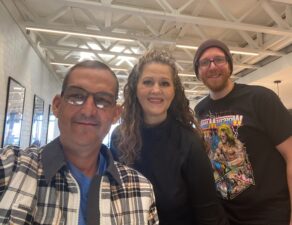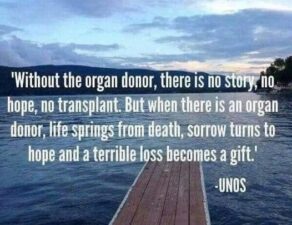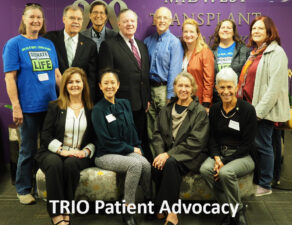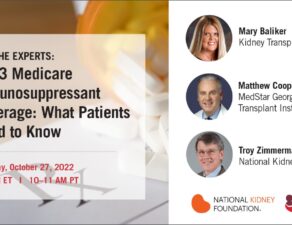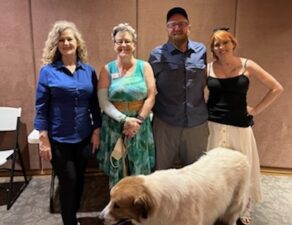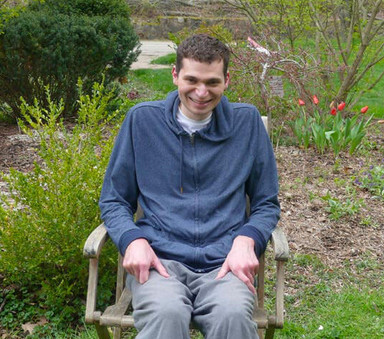
Author
Jane Racey Gleeson
May 20, 2021 5:00 AM
Vincent Pisoni has learned that life isn’t always easy, but a positive outlook has kept significant challenges from standing in his way.
Vincent Pisoni has faced many challenges in his 34 years, including major issues with his heart as well as learning and academic challenges.
He has successfully navigated all of them, thanks to support from his dedicated educators, employers, family, friends and medical team, as well as a positive outlook that continues to anchor his happy, productive life.
When Pisoni was diagnosed with advanced heart failure in 2019 and learned about his treatment options, this positive outlook helped get him through some dark days when many might have given up hope.
Heart failure is the result of the heart muscle not being able to pump sufficient blood throughout the body to meet its nutrition and oxygen needs. As blood backs up, the veins, tissues and lungs become congested with fluid. The result can be shortness of breath, exhaustion, nausea and fluid buildup.
Pisoni’s heart failure caused him to experience all of these symptoms, which eventually led the Ann Arbor, Michigan, resident to an area hospital where he was treated with medication and closely monitored.
The medication, however, wasn’t enough. “I was getting sicker and sicker,” Pisoni says.
In need of a heart pump
Referred to the Michigan Medicine Frankel Cardiovascular Center for further evaluation, he met with a team of doctors who determined medication would not be the answer. Their recommended next step to treat his heart failure was a left ventricle assist device (LVAD).
An LVAD works by helping to pump blood from the left ventricle (the lower part of the heart) into the aorta, the main vessel that carries blood from the heart to the rest of the body. The pump is implanted inside the body and is connected to a driveline that exits through a small site in the abdomen. This driveline is then connected to a small computer, which keeps the pump working.
The device can be used as a bridge to a heart transplant for patients who meet the qualifications for a new heart but need temporary support to survive until a donor heart becomes available. It can also be therapy for patients with advanced heart failure who may not be eligible for a heart transplant.
MORE FROM MICHIGAN: Sign up for our weekly newsletter
For Pisoni, the LVAD, implanted in April 2019 by Michigan Medicine cardiac surgeon Jonathan Haft, M.D., was a bridge to a transplant.
Pisoni lived with the device for 16 months, keeping his positive attitude despite initial pain at the implant area and lifestyle limitations associated with his LVAD. He was also able to continue working in a local restaurant, further proof of his resolve to overcome life’s challenges. But a heart transplant was his ultimate goal.
Preparing for a transplant: 100% invested
“Given his age of 31 at the time, an LVAD was not ideal going forward,” says Michigan Medicine thoracic surgeon Paul Tang, M.D. “The device helped to stabilize him, but it is difficult to live long term with such a foreign device, which can cause infection at the driveline site and obligate him to a lifetime of blood thinners to prevent the risk of stroke and pump dysfunction.”
On the transplant list for 16 months, Pisoni recalls the night he found out that a suitable heart had become available.
“I got the call around 1:30am on August 12, 2020,” he says, noting that he never hesitated to take the next step. “I had confidence in Dr. Tang. I was confident everything would work out well.”
He was also happy to have support from other Michigan Medicine transplant families, his LVAD doctor, Haft, and countless well-wishing friends.
In fact, Pisoni’s parents, Linda and Ron, were surprised by the support of friends they never knew he had – some from his jobs at Ann Arbor-area restaurants where he was loved my many. Hospital visitors included a chef and a founder of well-known area restaurants who had urged their dedicated employee to take on more responsibilities in the kitchen.
Like Podcasts? Add the Michigan Medicine News Break on iTunes or anywhere you listen to podcasts.
“His persistence and on-the-job learning from an early age served him well in facing serious medical challenges,” says Linda, noting that her son’s heart failure diagnosis and recommendation for the LVAD came about very quickly. She also credits the many dedicated educators in his school system who encouraged hands-on learning in a traditional setting as being invaluable in helping her son navigate his health challenges. “There were so many good people in his life along the way.
“Vincent’s father and I were impressed with the medical team’s patience and dedication in communicating with Vincent. One of the doctors assured me that the staff realized he was 100% invested in dealing with his medical challenges and in making, for himself, the best decisions available.”
“Linda and I are thankful for the incredible care by so many amazing doctors, nurses, PAs, NPs, social workers and all the other staff at Michigan Medicine,” says Ron. “There were so many times we would watch in awe of the nurses, NPs and PAs doing their jobs throughout the day and the middle of the night with such great skill and nurturing care. The care from the cardiologists and surgeons was always so thoughtful, knowledgeable and patient-centered.” Ron also acknowledges the excellent care his son received from the entire transplant team, which is responsible for nearly 1,000 adult heart transplants since 1984.
Healthy and happy
“Vincent has been able to live a socially active and rewarding life,” says Tang. “He’s made it through two major operations and has gone through all of this in such a graceful way.” Tang credits Pisoni’s successful outcome to his “very positive outlook and support from people who really care about him. He’s done very well and has been extremely motivated to get healthy.”
These days, Pisoni is home, continuing the rehabilitation he began as a patient at the Frankel CVC. A dedicated gardener, he’s looking forward to breaking his record of 62 tomato plants grown last summer, along with beans, squash, lettuce and more.
As he nears his one-year transplant anniversary in August, Pisoni shares his advice about facing seemingly insurmountable challenges: “Don’t give up on yourself – keep trying to get back to your normal life.”
Tang and Haft both agree that Pisoni’s positive attitude and outlook can serve as a lesson to us all. “His love of life and those around him have given him a feeling of fulfillment and joy,” says Tang.



